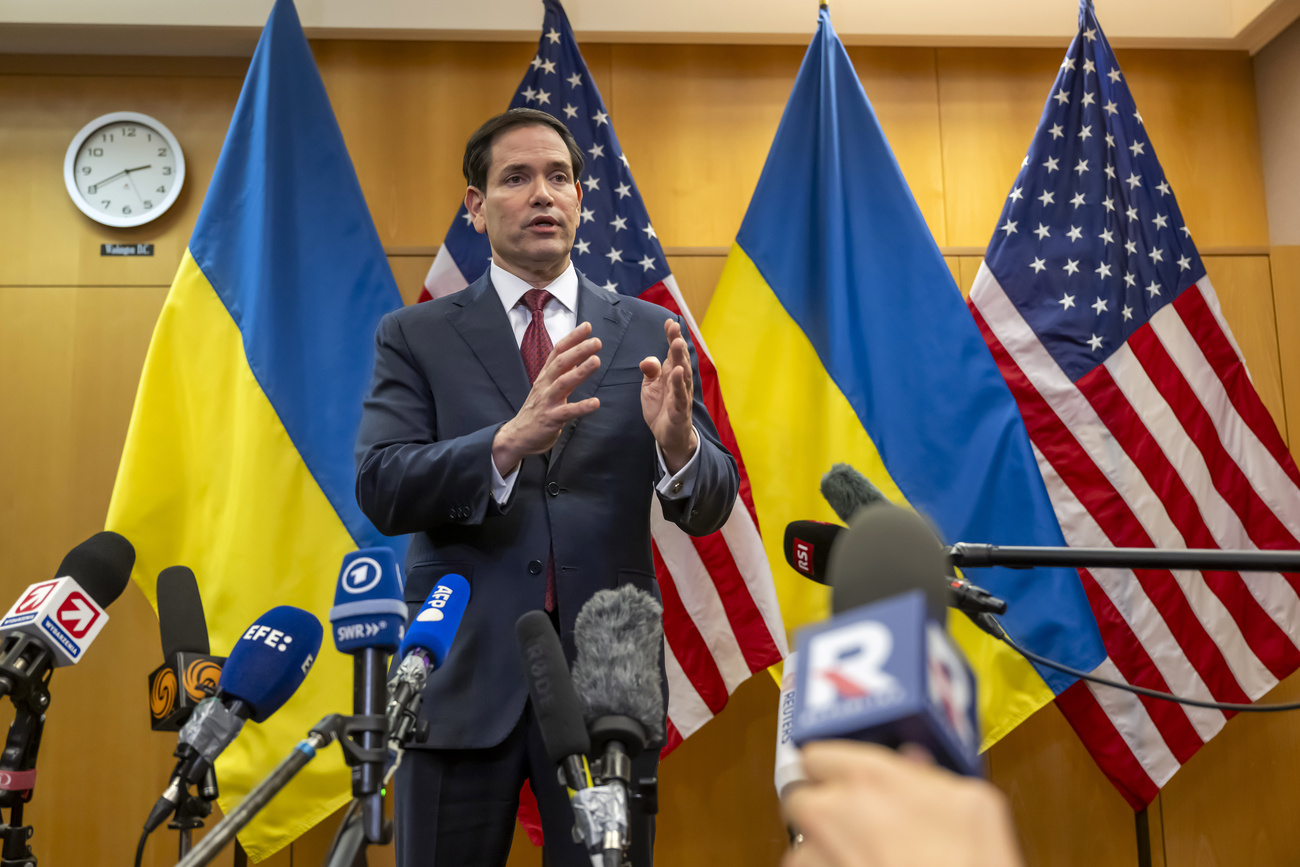
Swiss war materiel exports spark debate

The Ruag company of Bern has come under the spotlight after reports that some of its recent munitions exports to Qatar ended up in Libya.
Switzerland has legislation that clearly states that war materiel must not be exported to countries that are in conflict.
Ruag is a major technology company owned by the Swiss government and, among other things, is a provider of products and services for security and defence technology.
The State Secretariat for Economic Affairs (Seco) told swissinfo.ch that measures were in place to prevent exports of munitions being passed on to third countries.
The war materiel law and its associated regulations “contained a comprehensive catalogue of conditions for approval” of exports, it said in a statement.
There should be no risk that war materiel could be used against civilians, it said.
But these assurances have failed to convince politicians on the political left, who are demanding a complete halt to war material exports.
Guarantee
Seco said that export of war materiel to foreign governments can only take place, as a rule, when the secretariat has received a guarantee that the armaments will not be passed on to third countries.
It added that this year there had been two permits granted to Qatar valued at SFr737,200 ($916,346) for weapon accessories. There were no more pending.
Swiss television reported that Libyan rebels had been using munition made by Ruag from its Ammotec plant in Thun, south of Bern. The company specialises in small-calibre ammunition for hunting, sports, the military and government agencies. It is also a specialist in industrial pyrotechnics.
When the news broke, left-wing politicians began demanding a halt to war materiel exports. Some on the centre-right argued this is an isolated case.
According to the report, Seco had in 2009 authorised the export of materiel to Qatar which apparently did not respect its pledge not to pass it on to another country.
As a result, Seco decided not to authorise further exports to Qatar. The alleged case of delivery to Libya is being investigated.
Seco head of export control, Simon Plüss, told Swiss public radio DRS on Wednesday Seco would conduct an inspection visit to Qatar to ensure that munitions delivered were not being passed on to third countries.
Total stop
Jo Lang, a Green Party representative and member of a security policy committee of the Swiss parliament, says the suspension of export permits does not go far enough.
The leading figure of the pacifist Switzerland Without an Army group is calling for a total stop to exports of war materiel to Qatar, the Middle East and North Africa.
Evi Allemann from the centre-left Social Democratic Party says that to stipulate that the buyers of war materiel do not have the right to pass it on to third countries is nothing more than “nice words on paper” because it is more or less impossible to police.
Christian Democrat Jakob Büchler took a different position. The speaker of the security policy committee of the House of Representatives said the re-export of war materiel was an “unpleasant isolated case”, but he argued that further exports to Qatar should not be made until the facts were known.
Seco told swissinfo.ch that in some cases checks did take place, a so-called post shipment inspection.
But in the case of Qatar, there was no cause to use this. At the time the permit was issued, there was no reason to believe that Qatar would not abide by the contractual provisions.
In most cases the obligations of the buyers were completely respected and there were no problems. It also had to be taken into consideration that between 2,000 and 3,000 export requests of war materiel were handled on average each year.
Inconsistency
Some 70 law professors published a letter in 2009 criticising the supply of Swiss arms to India, Pakistan and Saudi Arabia, arguing this showed the inconsistency in Swiss policy.
However, Seco maintains that Switzerland in international comparison has “very restrictive” legislation when it comes to the export of war materiel.
It said that statistics of such exports showed that those states affected by insurgency in the Middle East, North Africa and the Gulf region were in the past not supplied by Switzerland or limitations were imposed.
In March 2009, the government had handled several export requests for war materiel and turned down a number of them because of the “unsatisfactory domestic situation and human rights situation in the recipient states, including Pakistan and Saudi Arabia”.
Since then, no requests for weapons system for the two countries had been approved.
The situation in India has been assessed differently from Pakistan or Saudi Arabia. Seco says that in the case of India, there can be no assumption of “severe and systematic” human rights violations.
Swiss weapons companies in 2009 delivered munitions to Qatar valued at SFr1.85 million, according to official figures.
Last year, Swiss companies sold SFr500,000 of light weapons to the country.
Qatar represents only a small part of Swiss military materiel exports.
The Swiss people clearly rejected a ban on exports of war materiel – by 68.5% – in a people’s initiative in November 2009.
(With input from Simon Bradley)

In compliance with the JTI standards
More: SWI swissinfo.ch certified by the Journalism Trust Initiative




























You can find an overview of ongoing debates with our journalists here . Please join us!
If you want to start a conversation about a topic raised in this article or want to report factual errors, email us at english@swissinfo.ch.